|
De Amerikaanse schrijver Irving Stone werd geboren op 14 juli 1903 in San Francisco. Zie ook alle tags voor Irving Stone op dit blog.
Uit:Lust for Life
“He did not know how much time passed. He got up, ripped the canvas off the frame, threw it into a corner, and put on a new one. He mixed some paints, sat down, and began work. One starts with a hopeless struggle to follow nature, and everything goes wrong; one ends by calmly creating from one’s palette, and nature agrees with it and follows. On croit que j’imagine—ce n’est pas vrai—je me souviens. It was just as Pietersen had told him in Brussels; he had been too close to his models. He had not been able to get a perspective. He had been pouring himself into the mould of nature; now he poured nature into the mould of himself. He painted the whole thing in the colour of a good, dusty, unpeeled potato. There was the dirty, linen table cloth, the smoky wall, the lamp hanging down from the rough rafters, Stien serving her father with steamed potatoes, the mother pouring the black coffee, the brother lifting a cup to his lips, and on all their faces the calm, patient acceptance of the eternal order of things. The sun rose and a bit of light peered into the storeroom window. Vincent got up from his stool. He felt perfectly calm and peaceful. The twelve days’ excitement was gone. He looked at his work. It reeked of bacon, smoke, and potato steam. He smiled. He had painted his Angelus. He had captured that which does not pass in that which passes. The Brabant peasant would never die.”
(...)
“The fields that push up the corn, and the water that rushes down the ravine, the juice of the grape, and the life of a man as it flows past him, are all one and the same thing. The sole unity in life is the unity of rhythm. A rhythm to which we all dance; men, apples, ravines, ploughed fields, carts among the corn, houses, horses, and the sun. The stuff that is in you, Gauguin, will pound through a grape tomorrow, because you and the grape are one. When I paint a peasant labouring in the field, I want people to feel the peasant flowing down into the soil, just as the corn does, and the soil flowing up into the peasant. I want them to feel the sun pouring into the peasant, into the field, the corn, the plough, and the horses, just as they all pour back into the sun. When you begin to feel the universal rhythm in which everything on earth moves, you begin to understand life….”
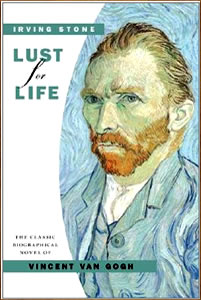
Irving Stone (14 juli 1903 – 26 augustus 1989)
Cover
De Duitse schrijver Volker Kaminski werd op 14 juli 1958 in Karlsruhe geboren. Zie ook alle tags voor Volker Kaminski op dit blog.
Uit: Der Strick
„Als ich an einem nasskalten Apriltag im Döblinhaus ankam, begrüßte mich ein Graf. Graf von Flotow, der in seinem Schriftstellerleben einen bürgerlichen Namen trägt, wahrte an diesem Abend die romantische Tradition und sagte, es würde im Fachwerkhaus spuken. Nach einigen nebulösen Andeutungen seinerseits und verdutzten Nachfragen meinerseits beschrieb er eine Begegnung mit einem hexenähnlichen weiblichen Wesen, das nachts an seiner Schlafzimmertür „gelehnt“ und ihn durch sein „Herschauen“ geweckt habe. Sein Hund sei auch wach geworden und habe den Geist heftig angebellt. Ich zog in die zuvor vom Grafen bewohnte Dachwohnung, wo ich nachts des Öfteren von unerwarteten Geräuschen geweckt wurde. Mal war es lautes Sirenengeheul, mal heftige Kratzgeräusche aus dem Hohlraum zwischen Wand und Dachboden, mal jämmerliches Quieken von Schweinen, die in den Morgenstunden auf einem Lastwagen zum Schlachthaus gefahren wurden. Frau Keyn war es, die mit ihrer robusten Bodenständigkeit allen Spuk vertrieb; sie war die sichere Bastion, der gute Geist des Ortes. Wir trafen uns jeden Mittag in der Küche zum gemütlichen Plausch. Durch ihre Gegenwart strömte ein nordisch klares Licht in das morsche Domizil. Ich erzählte Frau Keyn eine neue Spukgeschichte, die sich gerade in der Nacht zuvor ereignet hatte: Gegen halb zwei hatte sich das alte Transistorradio, das immer in der Küche stand, von selbst eingeschaltet und mit lauter Schlagermusik alle Bewohner geweckt. Frau Keyn lachte und wies ihrerseits mit ernster Miene auf die Rattenplage hin, die dem alten Haus zusetzte. Sie legte ihren Besen zur Seite und bat mich ihr zu folgen. Forsch erklomm sie die knarrende Treppe und ging auf eine Kammertür zu, die ich noch nicht bemerkt hatte. Knapper als gewohnt formulierte sie ihr Anliegen: „Mach mal auf!“ Sie gab mir einen Schlüssel, mit dem ich die Tür problemlos öffnen konnte. Ich schaute in eine Abstellkammer, in der sich auf staubigen Tischen und Bänken ausrangiertes Werkzeug und Gerümpel stapelte. Frau Keyn, die neben mir stand und schneller atmete als sonst, sagte leise: „Siehst du es?“ „Was denn?“
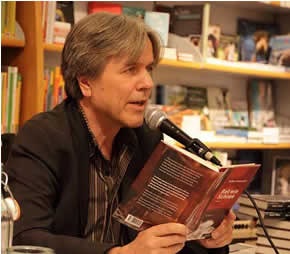
Volker Kaminski (Karlsruhe, 14 juli 1958)
De Italiaanse schrijfster Natalia Ginzburg werd geboren op 14 juli 1916 in Palermo. Zie ook alle tags voor Natalia Ginzburg op dit blog.
Uit: It'S Hard to Talk About Yourself (Interview met Marino Sinibaldi)
« SINIBALDI . . . whereas others, over time, take on a mythical stature: forexample, Rossi and Bauer, who were in prison.
GINZBURG I didnt know Rossi and Bauerbut people talked about them. Leone talked about them .
SINIBALDI Right, but didnt you also see Leone Ginzburg from this same distance, having heard him being talked about, when he was in prison? Wasnt there in his case, too, this way of looking at him that was a bit
GINZBURG No, no. Leone Ginzburg I knew before he went to prison, before.
SINIBALDI And then the relationship grew while you were apart?
GINZBURG Well, when he was in prison I would write him letters, because . . . well . . . he was in love with me, and I would write him letters, and he too . . . he would write to his mother and he would send me his love. Then he came out, in 36, and we met up again. He wouldnt come to ourhouse, not then, because at the time you had to be careful, you couldnt be seen together. I would see him outside, we would go forwalks and . . . I dont know if my fatherknew about it at first or not, but he didnt like the idea at all, because
FULVI Well, he had neverapproved of anyone.
GINZBURG He had never approved of anyone. But this time he really didnt approve. He said that Leone was ugly, then that he was broke, then that he was in danger. Basically, he didnt like him one bit: well, then at a certain point we got married, and he accepted it. Then afterward he liked him. He would say that Leone was very bright, very well-educated, and laterhe liked him, but early on there was . . . you know . . . something he didnt like.
SINIBALDI Leone didnt have qualities that brought solidity, perhaps . . .
GINZBURG Right. He had none of those.
SINIBALDI But in reality he was an intellectual of great solidity, of great renown. Im thinking of that debate on the subject of musical interpretation.
GINZBURG He was one of the real intellects of his time. When I knew him he was twenty-four, so when he was wr iting for this musical review he was twenty-two. He was exceptional; he always had been. He had an incredibly rich cultural background.”
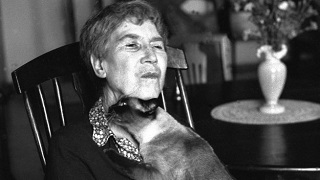
Natalia Ginzburg (14 juli 1916 – 7 oktober 1991)
De Franse schrijver en letterkundige Jacques de Lacretelle werd geboren in Cormatin (Saône-et-Loire) op 14 juli 1888. Zie ook alle tags voor Jacques de Lacretelle op dit blog.
Uit:Silbermann
« - Tu habites donc par ici ? Et où cela ?
Il voulut connaître le nom de la rue, le numéro de la maison, me questionna sur mes habitudes, sur ma famille, et enveloppa cette enquête de manières si naturelles et si amicales que j'eus plaisir à répondre, malgré ma retenue ordinaire.
- De quel côté allais-tu ? ajouta-t-il. Veux-tu que je t'accompagne ?
J'acceptai. Il me montra son livre.
- C'est une édition ancienne de Ronsard. Je viens de l'acheter, dit-il en caressant la jolie reliure de ses doigts qui étaient maigres et bruns.
Il l'ouvrit et se mit à me lire quelques vers. J'eus la même impression qu'en classe. Le texte lu par lui semblait baigner dans une source qui m'en donnait fortement le goût. Les mots avaient une qualité nouvelle : ils flattaient mes sens ; émotion ignorée, sorte de frisson dans mon cerveau. Mais de Silbermann lui-même que dire et comment dépeindre sa figure ? Il lut ces vers :
Fauche, garçon, d'une main pilleresse
Le bel émail de la verte saison,
Puis à plein poing enjonche la maison
Des fleurs qu'avril enfante en sa jeunesse.
Ses narines se dilatèrent, comme piquées par l'odeur des foins, et des larmes de plaisir emplirent ses yeux.
Nous étions arrivés à l'angle d'une pelouse où est érigée une statue de La Fontaine. Silbermann s'écria en la désignant :
- Est-ce assez laid, ce buste que couronne une Muse ? Et ce groupe d'animaux, le lion, le renard, le corbeau, quelle composition banale ! Chez nous on ne connaît que cette façon de glorifier un grand homme. Et pourtant il y en a d'autres. Ainsi, l'été dernier, j'ai été à Weimar et j'ai visité la maison de Goethe. On l'a conservée intacte. On n'a pas déplacé un objet dans sa chambre depuis la minute de sa mort. Dans la ville, on montre - et avec quel respect ! - le banc sur lequel il s'asseyait, le pavillon où il allait rêver. Je t'assure que de tels souvenirs ont de la grandeur. En France, on ne voit rien de pareil. Il y a quelques années, on a fait une vente au château de Saint-Point, en Bourgogne, où Lamartine a vécu. Eh bien ! mon père a pu acheter beaucoup d'objets qui avaient appartenu à Lamartine ; et, soit dit en passant, l'achat de ces reliques a été pour lui une très bonne affaire."
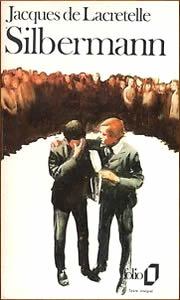
Jacques de Lacretelle (14 juli 1888 – 2 januari 1985)
Cover
De Russische dichter Gavrila Romanovitsj Derzjavin werd geboren in Kazan op 14 juli 1743. Zie ook alle tags voor Gavrila Derzjavin op dit blog.
The Swan
I'll leave the mortal world behind,
Take wing in an flight fantastical,
With singing, my eternal soul
Will rise up swan-like in the air.
Possessing two immortal traits,
In Purgatory I won't not linger,
But rising over jealousy
I'll leave behind me kingdoms' shine.
'Tis so! Though not renowned by birth,
I am the muses favorite,
From other notables a world apart-
I'll be preferred by death itself.
The tomb will not confine me,
I will not turn to dust among the stars,
But like a heavenly set of pipes,
My voice will ring out from the sky.
And now I see that feathered skin
My figure covers all around.
My breast is downy and my back is winged,
I shine with pearly swan-like white.
I fly, I soar-and see below
The world entire-- oceans, woods.
Like mountains they lift up their heads
To hear my lofty hymn to God.
From Kuril Islands to the river Bug,
From White Sea to the Caspian,
Peoples from half the world
Of whom the Russian race's comprised,
Will hear of me in time:
Slavs, Huns, the Scythians, and Finns,
And others locked today in battle,
Will point at me and they'll pronounce:
"There flies the one who tuned his lyre
To speak the language of the heart,
And preaching peace to the whole world,
Enjoyed the happiness of all."
Forget a big and stately funeral,
My friends! Cease singing, muses' choir!
My wife! With patience gird yourself!
Don't keen upon what seems a corpse.
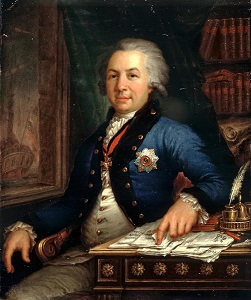
Gavrila Derzjavin (14 juli 1743 - 20 juli 1816)
Portret door Vladimir Borovikovsky, 1795
De Franse schrijfster van Belgische origine Béatrix Beck werd geboren in Villars-sur-Ollon op 14 juli 1914. Zie ook alle tags voor Béatrix Beck op dit blog.
Uit:Gide, Sartre et quelques autres
“Gide aimait beaucoup l’œuvre du poète Norge, surtout un poème intitulé « Monsieur », qu’il nous lut admirablement, avec un humour contenu :
Je vous dis que Monsieur est bête.
Je vous dis que Monsieur est mort.
Je vous dis que Monsieur est Dieu.
Naturellement, le vieil écrivain s’identifiait à ce « Monsieur » qui ne meurt que pour mieux accéder à la divinité. »
(…)
“Je voudrais terminer cette évocation de quelques figures connues en citant les paroles de deux amis, aujourd'hui morts. L'un était le grand critique littéraire et dramatique Marcel Thiebaut, directeur de la -Revue de Paris- Il déplorait que les écrivains actuels aient remplacé le pacte avec le diable par le contrat avec l'éditeur-autrement dit, que le sens des affaires ait remplacé celui de l'Absolu.
L'autre amie était la romancière et journaliste Nicole Vedrès, une vraie paysanne de Saint Germain-des-Prés . Elle diasit: "Il n'y a pas de justice sans justesse des termes", rejoignant ainsi Camus qui écrivit: "Il ne faut pas dire: justice est faite, mais: on lui a coupé le coup." Et concluait: "Appelons les choses par leur nom"
Cette règle d'or littéraire et morale, cette à la fois simple et difficile vertu d'exactitude, fait non seulement les vrais écrivains, mais aussi les citoyens courageux."
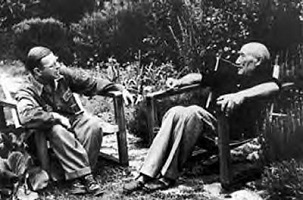
Béatrix Beck (14 juli 1914 - 30 november 2008)
André Gide (rechts) en Jean-Paul Sartre in gesprek
De Amerikaanse schrijver, scenarioschrijver en regisseur Arthur Laurents is geboren in New York op 14 Juli 1918.Zie ook alle tags voor Arthur Laurents op dit blog.
Uit: West Side Story
« A Back Yard - 5:30 p.m.
(Tony has been painting a sign for Doc's drugstore,
where he now works. Riff talks him into joining the
Jets at the dance, but Tony's mind is already on
other things.)
TONY:
Could be!
Who knows?
There's something due any day
I will know, right away
Soon as it shows
It may come connanballing down
Through the sky
Gleam in its eye, bright as rose
Who knows?
It's only just out of reach
Down the block, on a beach
Under a tree
I got a feeling there's a miracle due
Gonna come true, comin' to me...
Could it be, yes, it could
Something's comin', something good
If I can wait!
Something's comin',
I don't know what it is
But it is gonna be great!
With a click, with a shock ,
Phone'll jingle, door will knock,
Open the latch!”
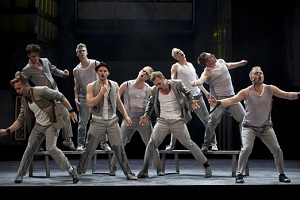
Arthur Laurents (14 juli 1918 - 5 mei 2011)
Scene uit een theateruitvoering in Göteborg, 2011
De Amerikaanse schrijver Owen Wister werd geboren op 14 juli 1860 in Germantown, Pennsylvania. Zie ook alle tags voor Owen Wister op dit blog.
Uit: The Virginian
"How is the health of that unfortunate—" "That's right! Pour your insults! Pour 'em on a sick, afflicted woman!" The eyes blinked with combative relish.
"Insults? Oh, no, Uncle Hughey!" "That's all right! Insults goes!" "Why, I was mighty relieved when she began to recover her mem'ry. Las' time I heard, they told me she'd got it pretty near all back. Remembered her father, and her mother, and her sisters and brothers, and her friends, and her happy childhood, and all her doin's except only your face. The boys was bettin' she'd get that far too, give her time. But I reckon afteh such a turrable sickness as she had, that would be expectin' most too much." At this Uncle Hughey jerked out a small parcel. "Shows how much you know!" he cackled. "There! See that! That's my ring she sent me back, being too unstrung for marriage. So she don't remember me, don't she? Ha-ha! Always said you were a false alarm." The Southerner put more anxiety into his tone. "And so you're a-takin' the ring right on to the next one!" he exclaimed. "Oh, don't go to get married again, Uncle Hughey! What's the use o' being married?" "What's the use?" echoed the bridegroom, with scorn. "Hm! When you grow up you'll think different." "Course I expect to think different when my age is different. I'm havin' the thoughts proper to twenty-four, and you're havin' the thoughts proper to sixty." "Fifty!" shrieked Uncle Hughey, jumping in the air. The Southerner took a tone of self-reproach. "Now, how could I forget you was fifty," he murmured, "when you have been telling it to the boys so careful for the last ten years!" Have you ever seen a cockatoo—the white kind with the top-knot —enraged by insult? The bird erects every available feather upon its person. So did Uncle Hughey seem to swell, clothes, mustache, and woolly white beard; and without further speech he took himself on board the Eastbound train, which now arrived from its siding in time to deliver him. Yet this was not why he had not gone away before. At any time he could have escaped into the baggage-room or withdrawn to a dignified distance until his train should come up."

Owen Wister (14 juli 1860 – 21 juli 1938)
Cover
De Amerikaanse schrijver Willard Frances Motley werd geboren op 14 juli 1909 in Chicago. Zie ook alle tags voor Willard Motley op dit blog.
Uit: Knock On Any Door
„Two gypsy women passed Nick. They wore several different-colored skirts, red and blue, yellow, green. They had big yellow earrings, dangling, and long braids; and their dresses were so low in front that if they stooped over you could have seen their belly buttons. There were beggars with sad eyes, with mouth organs, with hands held out. A blind man's cane tapped the sidewalk. Dress shops, hat shops, men's clothing stores were crowded together along Halsted, hiding the slum streets behind them. Hiding the synagogues, the Greek church, the Negro storefront churches, the taverns, the maternity center, the public bath.
Nick turned onto Maxwell Street. Before him stretched the Maxwell Street Market extending between low, weather-grimed buildings that knelt onto the sidewalk on their sagging foundations. On the sidewalk were long rows of stands set one next to the other as far he could see. On the stands were dumped anything you wanted to buy: overalls, dresses, trinkets, old clocks, ties, gloves-anything. On what space was left near the curb were pushcarts that could be wheeled away at night. There were still other rough stands-just planks set up across loose-jointed wooden horses: hats for quarters apiece, vegetables, curtains, pyramid-piled stacks of shoes tied together by their laces-everything. From wooden beams over storefronts, over the ragged awnings,hung overcoats, dresses, suits and aprons waving in the air like pennants.”
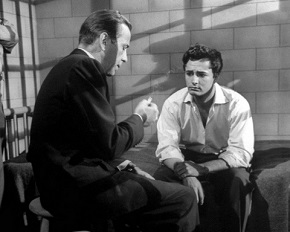
Willard Motley (14 juli 1909 – 15 maart 1965) Humphrey Bogart en John Derek in de gelijknamige film uit 1949
14-07-2017 om 18:18
geschreven door Romenu 
Tags:Irving Stone, Volker Kaminski, Natalia Ginzburg, Jacques de Lacretelle, Gavrila Derzjavin, Béatrix Beck, Arthur Laurents, Owen Wister, Willard Motley, André Gide, Jean-Paul Sartre, Romenu
|

